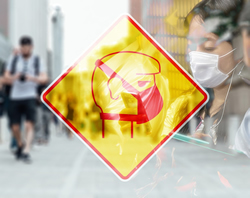Shelly Banjo, Livia Yap, Colum Murphy and Vinicy Chan* say coronavirus is creating the world’s largest work-from-home experiment.
 Thanks to the coronavirus outbreak, in some places, working from home is no longer a privilege, it’s a necessity.
Thanks to the coronavirus outbreak, in some places, working from home is no longer a privilege, it’s a necessity.
While factories, shops, hotels and restaurants are warning about plunging foot traffic that is transforming city centres into ghost towns, behind the closed doors of apartments and suburban homes, thousands of employers are trying to figure out how to stay operational in a virtual world.
“It’s a good opportunity for us to test working from home at scale,” said Alvin Foo, managing director of Reprise Digital, a Shanghai ad agency.
The cohorts working from home are about to grow into armies.
As Chinese companies begin to restart operations after the Lunar New Year break, it’s likely to usher in the world’s largest work-from-home experiment.
That means a lot more people trying to organise client meetings and group discussions via videochat apps or discussing plans on productivity software platforms.
One of the most unsettling factors for employees is the fast-changing impact of the virus, which is prompting daily changes in corporate directives.
How the coronavirus is infecting the global economy
Some managers worry the office exodus will lower productivity, but there’s evidence the opposite may be true.
A 2015 study from Stanford University in California found that productivity among call-centre employees at Chinese travel agency Ctrip went up by 13 per cent when they worked from home, due to fewer breaks and more comfortable work environments.
For many employers, instructing office workers to stay home only solves part of the problem.
Many rely on factories, logistics companies and retail outlets that face their own disruptions.
Even for those who can do business by internet and phone, the virus means there may not be much business to do.
Bankers say IPOs and deals are on hold.
Transaction value in the first 30 days of 2020 was half what it was the year before, according to data compiled by Bloomberg.
“The worst is yet to come,” said Nomura analyst Ting Lu in a research note.
“We reckon the coronavirus could deal a more severe blow to China’s economy in the near term, relative to SARS in 2003.”
The speed at which the new coronavirus has spread is fuelling fear.
A big part of the expected blow to the economy during the current outbreak is likely to come from changes in “human psychology”, according to Warwick McKibbon, Professor of Economics at The Australian National University in Canberra.
He said SARS cost the global economy $40 billion and predicts the hit from coronavirus will reach three or four times that amount.
“Panic is what seems to be the biggest drain on the economy, rather than deaths,” Professor McKibbon said.
With factories shuttered and office workers staying home, many in China’s services industry face a difficult time.
The sector is much bigger than it was during the SARS outbreak, accounting for 53 per cent of the economy, up from 41 per cent in 2002.
But without customers, many businesses are in limbo.
Some businesses have turned to the internet to help keep customers loyal, hoping to weather the epidemic.
* Shelly Banjo covers technology for Bloomberg in Asia. She tweets at @sbanjo. Livia Yap is China markets reporter at Bloomberg. She tweets at @liviayap11. Colum Murphy is Bloomberg Asia Technology Editor. He tweets at @Colum_M. Vinicy Chan is Deals Reporter at Bloomberg LP.
This article first appeared at www.bloomberg.com.



